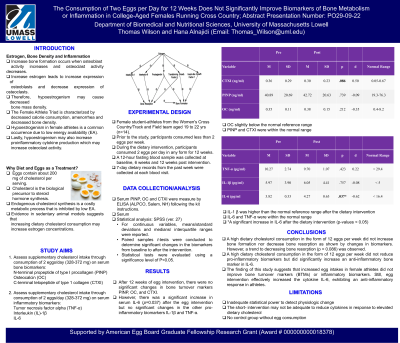Back

Objectives: The primary aim of this study was to investigate the effects of increased dietary cholesterol intake through the consumption of two eggs per day on biomarkers of bone metabolism and inflammation in female division one cross country and track athletes.
Methods: Fifteen female Division I student-athletes from university's women’s Cross Country/Track and Field Team (age 20.2+1.0 yrs.) participated in this study. Prior to the study, subjects were asked to refrain from all egg-based food products for two weeks. After this initial period, subjects were instructed to consume two eggs per day in the form of their choice for 12 weeks. Fasting venous blood samples were collected in the morning hours (0700 – 1000) following a 12-hour fast and absence of intense exercise training within the last 24 hrs at baseline and after 12 weeks. Serum was collected and immediately stored at -80°C until analysis. Serum bone formation markers; N-terminal propeptide of type I procollagen (PINP) and osteocalcin (OC) and bone resorption marker, C-terminal of telopeptides of type I procollagen (CTXI), and serum inflammatory biomarkers; tumor necrosis factor alpha (TNF-α), interleukin-1 beta (IL-1 β), and IL-6 were measured using ELISA kits.
Results: There were no significant changes in any of the bone metabolism biomarkers, but they were trending in a positive direction. Mean serum CTXI levels were slightly lower at 0.36 vs 0.30 ng/mL after the intervention, but not significantly (p = 0.083). Serum OC levels didn’t change 0.35 vs 0.38 ng/mL nor did serum PINP levels, 40.89 vs 42.72 ng/mL after the intervention. For the biomarkers of inflammation we did observe a significant increase in serum IL-6, 3.82 vs 4.27 pg/mL(p = 0.037) after the intervention. However, there were no significant changes in TNF-α, 10.27 vs 9.70 pg/mL or IL-1β, 5.97 vs 6.05 pg/mL after the intervention.
Conclusions: The current study shows no substantial changes in serum biomarkers of bone metabolism or inflammation after intervention with consuming two eggs per day for 12 weeks. However, there was a significant increase in IL-6 after the intervention.
Funding Sources: Supported in part by an Internal Seed Research Grant from the University of Massachusetts Lowell
Sports Nutrition and Physical Activity
(PO29-09-22) The Consumption of Two Eggs per Day for 12 Weeks Does Not Significantly Improve Biomarkers of Bone Metabolism or Inflammation in College-Aged Females Running Cross Country


Thomas A. Wilson, PhD, MPH
– Associate Professor, University of Massachusetts Lowell, Lowell, Massachusetts, United States- HA
Hana Alnajidi, PhD, MS
– University of Massachusetts Lowell
Presenting Author(s)
Co-Author(s)
Disclosure(s):
Thomas A. Wilson, PhD, MPH: No relevant financial relationship(s) with ineligible companies to disclose.
Objectives: The primary aim of this study was to investigate the effects of increased dietary cholesterol intake through the consumption of two eggs per day on biomarkers of bone metabolism and inflammation in female division one cross country and track athletes.
Methods: Fifteen female Division I student-athletes from university's women’s Cross Country/Track and Field Team (age 20.2+1.0 yrs.) participated in this study. Prior to the study, subjects were asked to refrain from all egg-based food products for two weeks. After this initial period, subjects were instructed to consume two eggs per day in the form of their choice for 12 weeks. Fasting venous blood samples were collected in the morning hours (0700 – 1000) following a 12-hour fast and absence of intense exercise training within the last 24 hrs at baseline and after 12 weeks. Serum was collected and immediately stored at -80°C until analysis. Serum bone formation markers; N-terminal propeptide of type I procollagen (PINP) and osteocalcin (OC) and bone resorption marker, C-terminal of telopeptides of type I procollagen (CTXI), and serum inflammatory biomarkers; tumor necrosis factor alpha (TNF-α), interleukin-1 beta (IL-1 β), and IL-6 were measured using ELISA kits.
Results: There were no significant changes in any of the bone metabolism biomarkers, but they were trending in a positive direction. Mean serum CTXI levels were slightly lower at 0.36 vs 0.30 ng/mL after the intervention, but not significantly (p = 0.083). Serum OC levels didn’t change 0.35 vs 0.38 ng/mL nor did serum PINP levels, 40.89 vs 42.72 ng/mL after the intervention. For the biomarkers of inflammation we did observe a significant increase in serum IL-6, 3.82 vs 4.27 pg/mL(p = 0.037) after the intervention. However, there were no significant changes in TNF-α, 10.27 vs 9.70 pg/mL or IL-1β, 5.97 vs 6.05 pg/mL after the intervention.
Conclusions: The current study shows no substantial changes in serum biomarkers of bone metabolism or inflammation after intervention with consuming two eggs per day for 12 weeks. However, there was a significant increase in IL-6 after the intervention.
Funding Sources: Supported in part by an Internal Seed Research Grant from the University of Massachusetts Lowell

.png)
